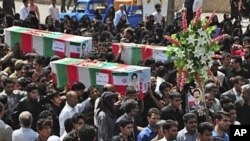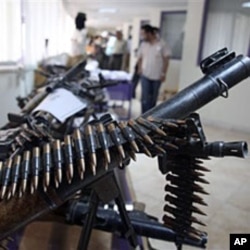The United States has placed an armed Iranian opposition group, Jundallah, on its terrorist list. Iran has long accused the United States of supporting Jundallah. There are several possible reasons Washington has decided to designate the group as terrorist.
According to analysts, the Obama administration has contemplated putting Jundallah on the terrorist list for some time, but the administration ruled out any conciliatory gestures to Tehran after the June 2009 contested Iranian presidential election and the subsequent crackdown on the unarmed and nonviolent opposition.
Since its emergence in 2003 as an armed opposition group, Jundallah has been a thorn in the side of the Iranian government. The Sunni group, claiming to be fighting for the rights of Iran's ethnic Baluchis, has carried out several high-profile bombings, the latest being a blast at a mosque in Zahedan that killed 27 people. The attacks have generally targeted members of Iran's Revolutionary Guard Corps.
Iran has accused the United States of covertly backing Jundallah as part of a bid to topple the Iranian government. The United States denies providing any support to the group.
Voicing what he emphasizes is his personal view, Congressional Research Service Iran analyst Ken Katzman says the Obama administration's gesture may be linked to trying to get negotiations on Iran's nuclear program back on track.
"There could also be an effort to say, hey, we have gotten this new round of sanctions, we have gotten other governments to enact very similar sanctions, and now we are trying to show some evenhandedness, that we are not trying purely to be punitive, we are not trying to go for some sort of regime change strategy here, we are committed to negotiations if we can find some sort of arrangement that suits everybody on the nuclear issue," said Katzman.
Iran has been sending mixed signals about renewing nuclear talks. The so-called P-5+1 group - the five permanent members of the U.N. Security Council plus Germany - have been consulting about how to deal with Tehran. But U.S. officials say the designation of Jundallah is not tied to the nuclear issue.
However, Iran analyst Reva Bhalla of the private intelligence firm Stratfor says there is another motivation for the gesture.
"But, really, I think the heart of the matter between the United States and Iran remains on Iraq, and figuring out whether there can be some sort of mutual understanding over the level of Iranian influence and a U.S. recognition of that influence, while making sure at the same time that the United States has a foothold in the region to keep the Iranians at bay, and work with its Gulf allies, and with Turkey especially, to make sure that Iranian power is somewhat contained," said Bhalla.
The Iraqi political stalemate has dragged on since the March elections in which no party secured an outright majority. Efforts are centered on some kind of government of national unity that includes Shia, Sunni, and Kurdish parties, and analysts say Iran wants to be sure that the outcome is favorable to its interests.
Speaking from Iraq, U.S. Deputy Commander for Operations in Iraq Lieutenant General Robert Cone said Iran has exerted positive and negative influence in Iraq, but that its influence appears to have waned.
"I think you would say that probably in the last couple months, in this period of government formation, we think that the Iranian influence has diminished somewhat, and I think overall that is probably appropriate for where we are, at least on the violence side at this point in the formation of the government and in the current delicate political situation that we are in," Cone said.
Reva Bhalla adds there is unease in the corridors of power in Tehran that there will be more pressure on President Obama to take a tougher stand with Iran, particularly on the nuclear issue, after the Republican Party gains in the recent U.S. congressional elections.
"On the Iranian front, though, that is going to take a huge maneuver, something along the lines of Nixon goes to China, where the U.S. would have to reach a very broad strategic accommodation with the Iranians. And whether that is done through force or through negotiated settlement, who knows?" Bhalla asked. "But I think that Iranian question could come into play a lot more prominently as a result of these elections."
But analysts say that even with more pressure from some quarters of Congress for action against Iran, the president still has the executive power in defense and foreign policy matters.





